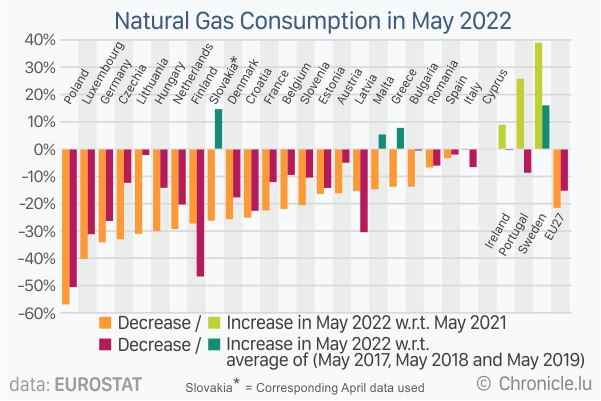
In May 2022 (the latest data available) natural gas consumption in Luxembourg fell 40.27% compared to May 2021, according to data analysed from the European statistics agency Eurostat.
Across the European Union (EU), 21.54% less natural gas was consumed in May 2022 than that was used in May 2021, and 15.23% less than that of pre-pandemic levels (average of May 2017, May 2018 and May 2019).
Excluding Cyprus, which does not publish its gas consumption, 23 EU Member States reported a net decrease in its consumption of natural gas in May 2022 compared to the month of May in the preceding year. Sweden, Portugal and Ireland reported a net increase in gas consumption over the same period.
The largest decrease in the consumption of gas in May 2022 compared to May 2021 was reported in Poland (down 56.91%), followed by Luxembourg (down 40.27%), Germany (down 34.20%) and Czechia (down 33.08%).
However, it is interesting to learn that the total EU gas consumption of 804,319 TJ (TeraJoules, in calorific value energy equivalent) in May 2022 was 58% less compared to during peak demand in the winter month of January 2022, at 1.916 million TJ. Traditionally, the months of June, July and August have the lowest energy demand for EU household heating needs.
At 31,351 TJ of natural gas consumed in 2021, Luxembourg represents only 0.2% of the total 15.834 million TJ of natural gas consumed by all Member States (excluding Cyprus) in 2021.
The need for a reduction in energy dependency from Russian gas and oil is in response to the Russian invasion of Ukraine and in anticipation of a partial or complete interruption in Russian gas flows to the EU. In effect, European Union Energy Ministers have planned to gradually reduce gas demand and reached an agreement at the extraordinary meeting of the Energy Council on 26 July 2022 to voluntarily reduce natural gas consumption by 15% between 1 August 2022 and 31 March 2023. In 2021, Russia provided over 40% of the EU's gas supply.
In addition to the agreement, the resulting Council regulation foresees the possibility of triggering a "Union alert" on security of gas supply, in which case gas demand reduction would become mandatory for all Member States.
The Luxembourg government has joined these gas consumption reduction efforts and has called for immediate vigilance and solidarity from all stakeholders.








